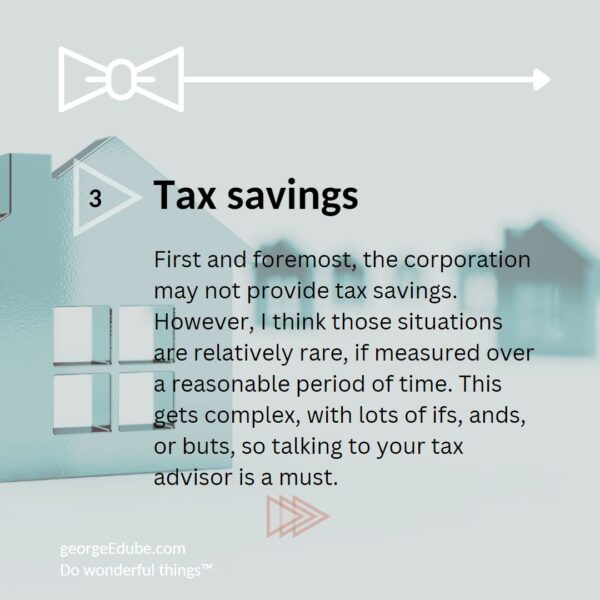Are you a Canadian real estate investor looking to take your business to the next level? If so, it’s time to explore the powerful advantages of incorporating your real estate business. Discover the top 5 reasons for buying property in a corporation, and why incorporating can be a game-changer. From increased flexibility to potential tax savings and improved financing opportunities, incorporating offers a range of benefits that can enhance your success in the world of Canadian real estate. So, let’s dive in and discover why incorporating your real estate business is a strategic move you don’t want to overlook.
You can watch the video below, or read the full transcript on the top 5 reasons for buying property in a corporation.
Video transcript: Top 5 reasons for buying property in a corporation
What are the five things that real estate investors should consider when deciding whether to incorporate their business?
I’m George Dube, saving the world from tax, one bow tie at a time.

I’d like to list these, and go through them, but just to list them initially:
- The first is flexibility.
- Second will be legal considerations,
- third, taxes,
- fourth, from a financing perspective, and
- fifth, I’d like people to be thinking about that business professional, organizational perspective.
How can incorporating a business provide flexibility?
And here, it’s perhaps easier to consider a common alternative, that being, personally acquiring real estate.

And so in a common situation, mom and dad have acquired 50% each of a piece of property that’s now recorded on their personal tax return. If I have a corporation, and certain conditions are met, I have the ability to decide
- who gets the income,
- when they receive the income,
- how they receive the income.
It may be in the form of dividends, wages, a bonus, a temporary loan. I have choices. I have an easier time of adding investors, or subtracting investors.
Whereas when I’m personally owning a property, and I don’t want to pretend that that is bad. I mean owning a nice real estate portfolio, can be a great thing, but to a degree I’m handcuffed. I have to record the income. I’m really adding up the beans in a very straightforward manner. And it’s pre-decided how they’re being divided.
With that corporation properly created, a lot of additional choices remain. That flexibility ultimately, generally, over time, saves taxes.
What are the legal reasons to consider when setting up a corporation?
So first and foremost, I am not a lawyer. You need to speak to a qualified legal advisor.

From a common thought perspective, or perhaps more appropriately, what I’ve been taught for my own portfolio, is that there are scenarios where that corporation can assist with what I will call creditor protection, protecting personal assets.
There are aspects where I’ll frequently hear a counter-argument to say that, well you’re going to put a guarantee, a personal guarantee, on a mortgage anyway, so what good does the corporation really do?
And my thought, and again, it needs to be discussed with your lawyer, is that once I’ve engaged in a transaction to put a mortgage, or some form of debt, on the property, right from day one, I’m aware of the bank’s existence, and the need to pay them back. I’m not scared of those numbers. I can potentially be concerned about the surprises that come, beyond that mortgage. And maybe it’s not perfect protection. But to me the more barriers I can put in place, the better. But again, please talk to your legal advisor.
What tax savings are applicable with a corporation?
First and foremost, the corporation may not provide tax savings.
I think those situations are relatively rare, if measured over a reasonable period of time.
And if I can address some of the tax saving possibilities, let’s consider…well, I’m going to cheat actually.

Tax reasons for buying and flipping properties in a corporation
Let’s consider first, someone that is flipping properties. In other words, they’re generating business income. That tax rate, depending on the province or territory we’re speaking of, might be as low as roughly 10%.
Contrast that to my personal income level, again, depending on the province, that personal tax level at the upper levels, is gonna be a lot closer to 50% or 50% plus, clearly a huge difference. Worst case scenario, if my income is so large at a corporate level, generally meaning, with some exceptions, it’s greater than a half million dollars a year, my tax rate would be, roughly speaking, 26 point a half percent, again, depending on the province or territory. That was still half of what I would otherwise be paying.
(Fore more details, see Flipping properties & saving taxes: Incorporating may be the answer.)
Tax reasons for buying and holding properties in a corporation
More common of course, is the long-term real estate investor, receiving rental income, interest income, things of that nature, that are considered from a tax perspective, passive. And many people get frightened, because initially, that tax rate is approximately 50%. What they don’t factor in though, is one, that 50% may not be much higher, if not lower, than what it would be on the personal side. Perhaps not today, but a little bit down the road, if things go well.
Next, at a corporate level, that 50% has embedded within it refundable taxes. And without getting into the details, roughly it’s 30%. Meaning, if I have to pay on day one, 50% in taxes, within that, once I pay myself, or a shareholders that are qualified, dividends, the corporation can receive a refund of 30%. So that net corporate tax may be 20%. 20% I can afford.
So now the implications are on the personal side: What was the tax impact to me as an individual, receiving that dividend? And here’s where it gets even muddier, because that combined tax rate may be worse, depending on the province, et cetera, by a little bit, by flowing through the corporation.
Alternatively, as an example, if I have no other source of income for a shareholder, and they’re eligible to receive dividends from the company, all of a sudden it’s possible, again, depending on the province or the territory, to roughly speaking, pay about $40,000 in dividends, and there’s less than $2,000 in taxes. And while that tax rate increases as we go beyond the $40,000, it takes a bit before we get into astronomical numbers.
And so now here’s where talking to your tax advisor to see what that true picture is over time, and remembering, if I’m an individual, paying roughly speaking that 50% tax, that money was gone forever. As a corporation, maybe I’m always going to be in a high tax bracket. Maybe I’m never retiring or going into semi-retirement. maybe my spouse is never going to retire. or is going to have so much income, she or he will not be in the higher tax bracket, or sorry, will always be in that higher tax bracket. Then what about my kids or my grandkids? Or maybe after years, perhaps generations, that corporation has accumulated several million dollars of refundable taxes, that are basically sitting there.
Perhaps the owner of that corporation says, “Hey, George, instead of buying my real estate, “why don’t you buy the shares of my company?” And within that company, “let’s split those refundable taxes.” So we’ve lost time value of money, but if we were going to lose it anyway, we’re still on the plus side.
The corporation, as a simple example, over time, can provide the tax savings. And we haven’t even talked about estate planning, retirement planning, succession. We haven’t talked about the ability to pay dividends at different times, to different people, and in different ratios. So as a very, very common example, one of the spouses may be earning a lot of T4 income, and if they had the properties 50/50, there’s a lot of taxes going to that high income earner, rather income going to them, taxes out the window.
With a corporation, it may be possible to pay those dividends to a lower income spouse, use up low tax brackets, and as a family, between personal and corporate, have a much better tax situation. Again, this gets complicated. There are a lot of, if, ands, or buts. It’s really important to talk to your tax advisor. But please, please, please, do not think that automatically, every situation is better or worse, just because a corporation exists.
(For more details, see Hold real estate corporately to save taxes?.)
Does incorporating help with the financing?
And here, historically, I’ve gotten myself into a lot of trouble, by not completely always, but very frequently saying yes.

And so it’s important to note, I am not a finance professional, or a mortgage broker. But it’s not like I haven’t financed real estate investments before. And it’s not like I don’t interact with many of those advisors, with my clients. And so a couple of thoughts from my side.
So one, I acknowledge it can be faster, less expensive, to initially be financing a personally-owned property, if we just measure the transaction of obtaining that financing, and the interest rate, and terms, in contrast to alternatives using incorporation. Again, I think is shortsighted. Frequently, the people that complain to me about, they cannot get financing with that corporation, they will say now, “I’ve now got five, six, seven properties,” depending on which financial institution we’re referring them to, “I’m finding it very, very difficult “to acquire additional financing, because I’m still acquiring personally.”
And so those clients and finance professionals will come to us and say, “We need to transfer all these personally-owned properties “to corporations.” There’s some significant costs there. Not that we don’t do it on a regular basis, but we could have avoided it.
I’d suggest that the corporation provides more opportunities for those advisors that know how to work with corporations, and financing, and are skilled at that. And that’s going to take out the vast majority. That doesn’t mean the vast majority are bad. It means that they’re probably not working with sophisticated real estate investors, going beyond the common threshold of five-ish properties.
And there’s quite a few well-known financing outfits out there, that are fantastic in that financing for that first five or so properties. But then they run into that proverbial wall.
So on first few properties, I would much rather be planning for that proverbial wall, and what lies beyond. And that often is going to mean setting up a corporation.
What are the business reasons for incorporating?
And perhaps this is not as strong a consideration for most people, compared to the other four areas that I like to focus on. But I think it does have merit.

So the example that I like to give, is that perhaps, you are trying to negotiate a vendor takeback with dear old grandma. And if you’re coming at that as an individual who is personally owning property, yeah, whatever.
Whereas, if I come at it from a corporate perspective, I have a much different image, a much more professional image, I would suggest. “Grandma I know this is important for you. This is not my first rodeo. I’ve done these transactions before. I can help you, I can help me. We can create a win-win situation.”
In working with other advisors, contractors, investors, having that corporation certainly provides a different image, in contrast to personal ownership. I’d also suggest some people just like having a little bit of what I will call compartmentalization. And that can be as simple as saying, “If I personally own all my properties, it’s all kind of in one big pot.”
Whereas with corporations, now:
- I can segregate, based on different investors that are I investing with me.
- I can segregate based on different provinces, which also may have some tax implications.
- I can segregate based on the type of investments that I’m making, active versus inactive, from a tax perspective.
Corporations provide more choices. And they allow that image to be very different than just doing something personally. Not that personally is always bad, but I would certainly consider, what are you trying to portray to the outside world?
What’s the most important reason for buying property in a corporation?
So in identifying the five different areas that we like to think about, and deciding whether to incorporate or not, what’s more important?
And here I would toss it back to you. And that’s to say for different people, they will place different levels of importance on any one of those five, or have different orders for what’s important to them.
So I may be talking to a client, and make a recommendation, once I know what is important to them, and have a very different advice, for a client in, practically speaking, an identical situation, because they’ve told me they place more emphasis on something else. So as an example, someone may be absolutely convinced that they want that legal protection, associated with a corporation, regardless of what the tax impact may be. So it’s not that something is right or wrong. It’s that something can be right or wrong for you.
Thanks for watching, considering all the different aspects of whether or not to incorporate your real estate investment business. and again, it’s summary in nature. There’s a lot more to it that will also be dependent on your particular situation. Please do talk with your advisor.
And remember, I’m George Dube, saving the world from tax, one bow tie at a time.
Have more questions?
Please subscribe, follow and even share.
I want all of us to have the tax information we need, to do wonderful things.
-End transcript-
More resources on buying property in a corporation
For additional resources related to reasons for buying property in a corporation:
More questions about incorporation and buying properties?
Still have questions about the reasons for buying a property in a corporation? I want to help you Do Wonderful Things™ with your real estate investments, so please contact me today.
Remember – circumstances are unique! This information on reasons for buying a property in a corporation is summary in nature. Seek out advice from your tax advisor about your specific situation.


